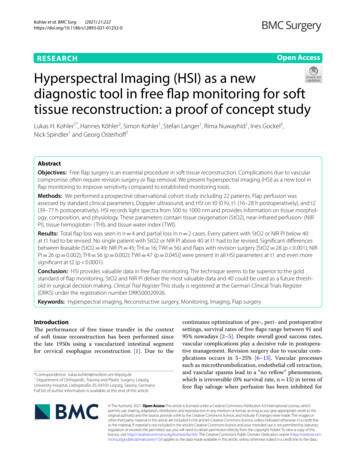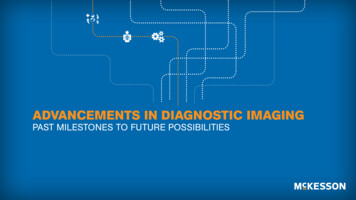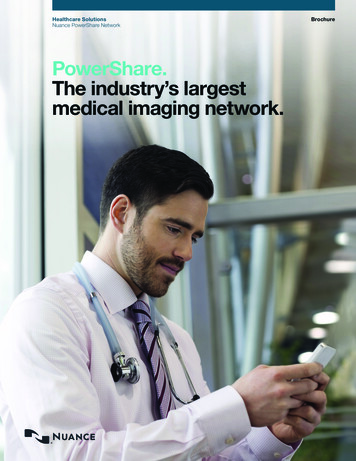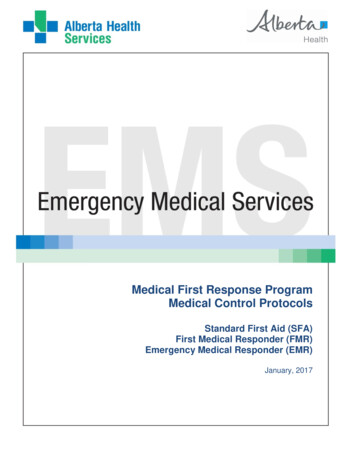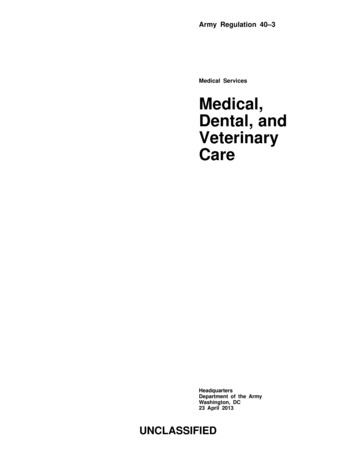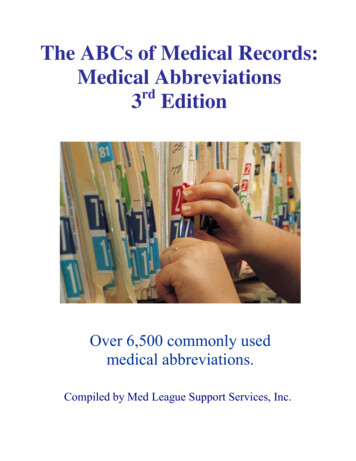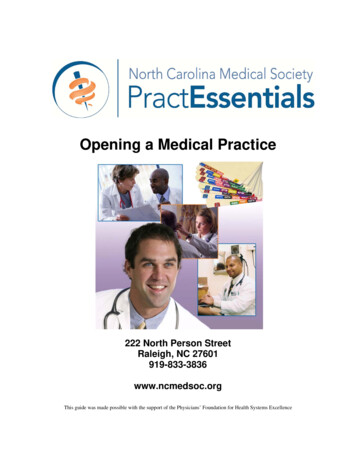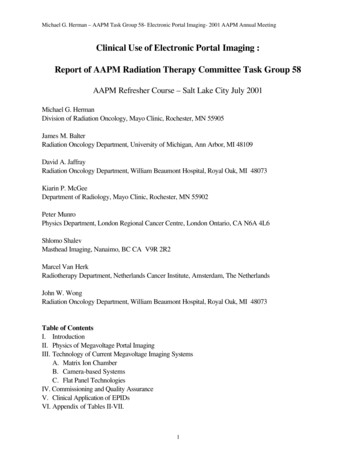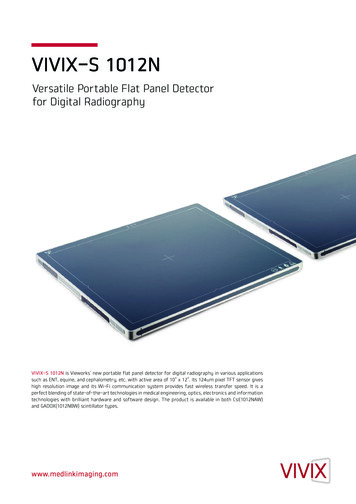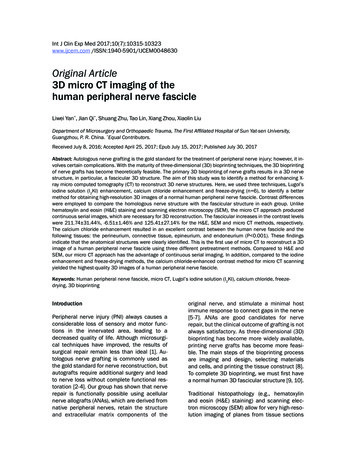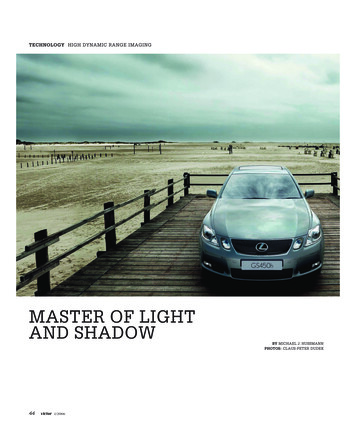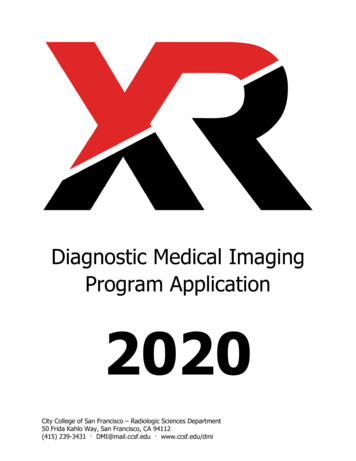
Transcription
Diagnostic Medical ImagingProgram Application2020City College of San Francisco – Radiologic Sciences Department50 Frida Kahlo Way, San Francisco, CA 94112(415) 239-3431 · DMI@mail.ccsf.edu · www.ccsf.edu/dmi
ContentsINTRODUCTION . 3Program Overview . 4APPLICATION PROCESS . 5Preapplication Preparation . 5Application Checklist . 5Application Instructions . 5Selection Process . 5PREREQUISITE COURSE GUIDELINES. 6Prerequisite Courses to Complete Before Application . 6Prerequisite Courses to Complete Before or After Admission . 7Prerequisite Course Requirements . 7VOLUNTEER GUIDELINES . 8PHYSICAL, MENTAL, AND EMOTIONAL APTITUDE REQUIREMENTS FOR RADIOLOGIC TECHNOLOGIST. 9PROGRAM EXPENSES . 10TRANSFER AND ADVANCED PLACEMENT . 11PHYSICAL EXAMINATION, VACCINES/TITERS, BACKGROUND CHECK, AND DRUG SCREEN . 11At the time this application went to print, all information within was current, true and correct.Every effort has been made to ensure that this application packet is free from content, spelling,and typographical errors.2
INTRODUCTIONThank you for taking the time to read this information and application packet. This packetcontains all the information you need to apply to the Diagnostic Medical Imaging (DMI)program at City College of San Francisco. We hope it answers all of your questions but if it doesnot, feel free to email us at DMI@mail.ccsf.edu.The first step is to learn the proper name of the profession you want to enter. We are known aseither radiographers or radiologic technologists. Radiographers are highly skilled members ofthe healthcare team with responsibilities that include assisting physicians to performcomplicated and difficult procedures. These professionals also work with surgeons duringsurgical procedures in the operating room. Radiographers also have continuous contact withpatients; they educate patients about the examination, give injections of contrast material whenneeded and also give emotional support. Radiographers monitor each patient as they performthe examinations and react to emergency situations as a first responder. This professionencompasses far more than simply radiographing the skeleton.Successful radiographers are detail oriented, interested in science and math, comfortable withcomputers, empathetic towards patients, customer service oriented, know how to prioritizebased upon the needs of patients and physicians, and have excellent communication skills.They also possess critical thinking skills the enable them to adjust to complicated situations.This DMI Program is a rigorous, demanding, full-time program that makes outside employmentdifficult if not impossible. Candidates are strongly urged to evaluate their financial status priorto application and plan for expenses including tuition, fees, books, uniforms, shoes, andtransportation. It is also strongly recommended that applicants complete their GeneralEducation (GE) courses required for the Associate of Science degree prior to entering the DMIprogram.Students are encouraged to visit the counseling departments at CCSF regarding questions aboutHow your courses can be used for the DMI program and for graduation purposes. Please notethat the DMI faculty do not evaluate transcripts for graduation requirements. However,counselors can assist in this process.3
Program OverviewThe DMI program has a rich history starting in the 1950’s at City College of San Francisco. Thisprogram enjoys long-term relationships with major San Francisco Bay Area hospitals wherestudents conduct their clinical laboratory education. The DMI program has achieved prestigiousaccreditation by the Joint Review Committee on Education in Radiologic Technology.The goal of this department is to prepare its students to function competently in an entry-levelposition as a Radiologic Technologist. The DMI Program is an integral part of this communitycollege and combines general education and radiology courses to accomplish that goal. TheDMI program is full-time, 30 months in length and can lead to national certification and statelicensure.All successful program students must graduate with an Associate’s degree with a major inDiagnostic Medical Imaging upon program completion. Those students who already possess anA.A., A.S. or higher degree must matriculate through the college and meet all CCSF graduationrequirements to complete the DMI program major. Upon completion of the DMI courses, andhaving met the CCSF requirements for graduation, the student is eligible to apply for thenationally recognized American Registry of Radiologic Technologists (ARRT) certificationexamination in Radiography, and upon passing, will be eligible to apply for the CaliforniaCertified Radiologic Technologist (CRT) license and California’s Fluoroscopy Permit.4
APPLICATION PROCESSPreapplication PreparationIt is recommended to meet with a CCSF counselor if you are interested in pursuing diagnosticmedical imaging. The counselor can assist in selecting courses that meet the applicationrequirements and will prepare you for the program.Application Checklist Become an official student at CCSF (if not already a CCSF student) Meet with a counselor Gather all required documentation as described in this packet Applicant Information form Volunteer Hour Verification form Volunteer Objective Questions Science GPA Prerequisite Calculation form All official transcripts from every college/university attended Statements (if required) Place all documentation in one package and mail to the DMI ProgramCity College of San FranciscoRadiologic Sciences DepartmentDiagnostic Medical Imaging50 Frida Kahlo Way, Box S-68San Francisco, CA 94112Application Instructions--The application period is from August 1st through August 10th of the current year foradmissions into the coming Spring or next Fall cohorto Ex. apply in August 2000 for admissions in Spring 2001 or Fall 2001 cohortApplications must be mailed according to the instructions in this packetAll application packets must contain the official forms found within this packet and willnot be accepted if hand delivered, mailed in early, or mailed after the deadlineApplicants, who have submitted an application in previous years and wish to re-apply,must submit a new application with all supporting documentation includedPlease keep a copy of your application material. All applications and associated materialbecome the property of the DMI program and will not be returnedSelection Process-All communication regarding application status can be made by e-mail to DMI@ccsf.eduAll correspondence will be through official CCSF emailSuccessful applicants will be determined by the random selection processApproximately 15 students are admitted into the DMI program each semesterIf selected, the student must complete and pass health requirements, backgroundcheck, and drug screening5
PREREQUISITE COURSE GUIDELINESPrerequisite Courses to Complete Before ApplicationThese courses must be completed before applying to the program. All courses must becompleted within seven years of application date.- Chemistry with Lab (CHEM 32 or CHEM 101A)o CHEM 32 or CHEM 101A is a prerequisite of BIO 112, which is a programprerequisiteo CHEM 40 does not meet this requirement- English (ENG 1A)o Advanced Placement (AP) Students who have Advanced Placement credits for Language &Composition or Literature & Language Composition and can furnishCollege Board transcripts with test results of 3 or higher can fulfill thispre-requisite requirement- Human Anatomy with Lab (BIO 108)o BIO 106 does not meet this requiremento Combination courses of Anatomy and Physiology will not be accepted unless theyare equivalent to BIO 108 and BIO 112 and at least four units per semester- Human Physiology with Lab (BIO 112)o BIO 106 does not meet this requiremento CHEM 32 or CHEM 101 is a prerequisite for BIO 112o Combination courses of Anatomy and Physiology will not be accepted unless theyare equivalent to BIO 108 and BIO 112 and at least four units per semester- Intermediate Algebra (MATH 46 or MATH 60)o Statistics is not a substitute for this requiremento You will need to complete MATH 46, MATH 60, MATH 90, MATH 92, or othercollege-level algebra course (3 units minimum)o Math Placement CCSF assigned math placements in MASTEM 2000, 3000, or 4000 havefulfilled this prerequisite CCSF assigned math placement in MASTEM 1000 must complete one ofthe following: MATH 46, 60, 90, or 92 A math placement score of MATH 60 or above before January 2019 isacceptable if within the last 7 years of application deadlineo Advanced Placement (AP) Students who have Advanced Placement credits for Calculus AB or BC,and can furnish College Board transcripts with test results of 3 or highercan fulfill this pre-requisite requirement- Physics with Lab (PHYC 10 and PHYC 10L)6
Prerequisite Courses to Complete Before or After AdmissionThese courses are not required to be completed before applying to the program; however, ifadmitted to the program, these courses must be taken before the start of the 3rd semester.These courses are required for graduation. It is highly recommended to take these coursesbefore entering the program.- Advanced First Aid and Basic Life Support (EMT 14)o Completes CCSF Area G- Intro to Radiologic Technology (DMI 49)- Medical Terminology (HIT 50A)- Psychology (PSYC 1 or 26)o Completes CCSF GE Area D- Public Speaking (CMST 1A, 11, or 12)o Completes CCSF GE Area APrerequisite Course Requirements----Prerequisite courses and placement tests must be completed within the past seven yearsprior to submitting an application, with the exception of EnglishAn overall 2.0 GPA is required of all college courses attempted and listed on your officialtranscripts at submissionA minimum 2.5 GPA is required of all math and science prerequisite coursesGrades lower than “C” are not acceptable in the prerequisite courses for the programPrerequisite courses may be taken at any accredited college, but they must be evaluatedas the exact equivalent of those offered at CCSFo Contact a CCSF counselor for assistance is in requesting course equivalencyand/or comparability, and to learn about the transcript evaluation submissionprocessAcademic history of more than four incomplete grades, withdrawals, repetition ofprerequisite courses, due to failures, academic probation, etc., may cause yourapplication to be disqualified. More than four is considered excessive by the DMIprogram and an indication of academic problems.o If you have more than four incomplete grades, withdrawals, and/or repetition ofprerequisite courses complete an essay explaining the reasons for your academichistory. This essay is not a guarantee of admission, however, it will be taken intoconsideration.No credit is given for high school coursesHigher-level courses without a lab does not meet the requirement for Chemistry,Anatomy, Physiology, and Physics7
VOLUNTEER GUIDELINESAll applicants and hospitals must adhere to the following guidelines.- Volunteering must be completed within seven years of application date- Complete 40 hours of both patient and radiographer observation during generalradiographic procedureso Volunteer experience can only take place in an acute care setting (hospital) Ambulatory care settings (clinic), doctor’s offices, veterinary’s offices, etc.are not acceptable Hours spent volunteering in healthcare settings other than in a hospitalwill not be credited towards the prerequisiteo Complete the Volunteer Hours Verification Form provided in this packet If the hours are not verifiable or total less than 40, the hours will not beaccepted and will cause the applicant to be disqualifiedo Some hospitals may require students to complete 100 hours of volunteering All hours beyond the 40 in radiology can be done anywhere within thehospital system Volunteering more than 40 hours in a radiology department will notimprove an applicant’s chances of admission to the program- The applicant has two options when completing volunteer hours1) Volunteer 40 hours in general radiography2) Volunteer 30 hours in general radiography and 10 hours in special modalities General radiography includes General Radiology (Skeletal Radiography, Chest X-Rays, etc.) Fluoroscopy (Barium Studies, HSG, VCUG, RUG, etc.) Surgery (any surgical procedure) Special modalities include Computed Tomography (CT) Magnetic Resonance Imaging (MRI) Ultrasound (US) Mammography Bone Densitometry (Dexa) Interventional Radiography (IR)- It is the applicant’s responsibility to contact the hospital, schedule the volunteer hours,and complete the requiremento Suggested hospitals in San Francisco University of California, San Francisco (UCSF) Contact: David Poon (LapKong.Poon@ucsf.edu) UCSF requires completion of Anatomy and Physiology California Pacific Medical Center (CPMC) Contact: (415) 660-0374 CPMC requires a minimum of 100 volunteer hours Zuckerberg San Francisco General Hospital (ZSFGH) Contact: zsfghvolunteer@sfdph.org Veteran’s Administration Medical Center Contact: Jain Li (JainXiangLi@va.gov)8
PHYSICAL, MENTAL, AND EMOTIONAL APTITUDEREQUIREMENTS FOR RADIOLOGIC TECHNOLOGISTThe student technologist must be capable of meeting all the following demands of the job,which are included in the job descriptions of all employers:Motor Function Stand unassisted for long periods of time Lift patients on and off the radiographic table independently 80% of the time as well asin and out of hospital beds, stretchers, and wheelchairs Lift and handle radiographic accessories and equipment of at least 30 lbs. above head Manipulate stationary and mobile radiographic equipment Assist personnel and patients in emergency situationsVisual Observation Observe and evaluate reasonably, patient's condition using signs and symptoms Interpret instrument control panels, technique charts, and other materials forappropriate operation of equipment and patient care View and critique radiographs, interpret quality factors, identify anatomy and listtechnical and procedural componentsHearing Ability Normal hearing or have hearing corrected to within normal range when facing patientsor with back turned toward patient Hear in situations when not able to see lips (i.e., when masks are worn) Hear auditory alarms (i.e. monitors, fire alarms)Tactile Feel vibrations (e.g., palpate pulses) Detect temperature (e.g., skin and/or solutions, etc.) Feel differences in surface characteristics (e.g., skin, rashes)Communication Skills The student must be able to transfer information by verbal and non-verbal means topersonnel and patients The student must be able to receive and interpret communication from personnel andpatients and adhere to appropriate Health Insurance Portability and Accountability Act(HIPAA) confidentiality laws The student must be computer literate and able to operate a variety of computerprograms, instructions, and compile data on a routine basisBehavioral and Social Skills The student's behavioral and social skills must be acceptable within the college andclinical locations9
PROGRAM EXPENSESTuition, health fees and other general information for CCSF may be obtained from the Registrar’sOffice and at www.ccsf.edu.The estimated costs of attending the program are as follows and may change without notice.ExpenseBooks and other teaching/study materials requiredUniforms, Lab Coats, Shoes, Radiology Markers, etc.Radiation Monitoring DeviceBackground and Drug Screening and Health RecordsHealth Fitness Verification and immunization titersHospital Competency TrackingBoard Exams at end of programResident of California Tuition per credit hourNonresident of California Tuition per credit unitTotal DMI program costs with tuitionTotal DMI program costs for SF residentsApproximate Cost 2,000 500 200/year 200Cost dependent upon student’s healthinsurance 200 500 46 264 6,000 - 7,000 3,600TransportationStudents are responsible for providing their own transportation and any related expenses to andfrom the campus and clinical education centers. Student placement in the clinical facilities isdetermined by the program officials and not the student. Transportation issues are notconsidered in clinical placement assignments.HousingStudents are responsible for their own room, board, and other living expenses. Campus housingis not available.10
TRANSFER AND ADVANCED PLACEMENTTransfer and Advanced PlacementAdvanced placement in the DMI program is not granted to students transferring from otherradiology/medical programs, international graduates, students who were dismissed and reapply,or due to loss of a CRT licensure or ARRT certification. All accepted students must start theprogram from the beginning.International Radiographer TrainingThe City College of San Francisco does not have a curriculum for Radiographers educated inother countries to achieve credentialing in the United States. If you would like informationabout the programs of this nature, please refer to the American Registry of RadiologicTechnologists website, www.ARRT.orgPHYSICAL EXAMINATION, VACCINES/TITERS,BACKGROUND CHECK, AND DRUG SCREENUpon acceptance into the DMI program the following must be completed:1. Physical examination by a physician to determine the physical health of the student2. Vaccinations and positive titers* against certain diseases3. Negative background check for any previous felony or misdemeanor convictions4. Negative drug screeningAny misdemeanor, felony conviction, or positive drug finding may impact the applicant’s ability toattend the clinical education component, complete program requirements and/or obtain eligibilityfor certification. If the applicant has ANY previous convictions of a misdemeanor or felony, pleasecontact the American Registry of Radiologic Technologists (ARRT) at www.ARRT.org ethicsdepartment or call (651) 687-0048 before starting the program in order to establish eligibility forcertification.Background checks, drug screening, physical examinations and vaccinations/titers are requiredto attend the clinical portion of the program. A positive result of a conviction or positive drugfinding or failure to comply with vaccinations and titers may be grounds for program dismissaldue to lack of clinical placement. The cost of these requirements is the responsibility of thestudent.11
CITY COLLEGE OFS
program at City College of San Francisco. We hope it answers all of your questions but if it does not, feel free to email us at DMI@mail.ccsf.edu. . college and combines general education and radiology courses to accomplish that goalThe . DMI program is full-time, 30 months in length and can lead to national certification and state
